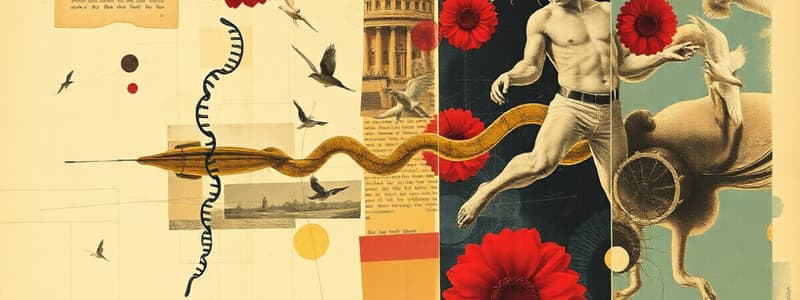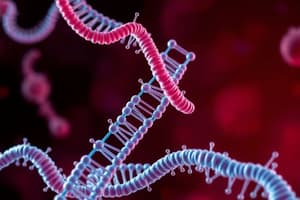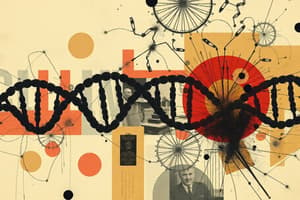Podcast
Questions and Answers
What role do co-repressors play in the regulation of biosynthetic operons?
What role do co-repressors play in the regulation of biosynthetic operons?
- They inhibit and prevent the binding of repressors.
- They allow repressors to bind to the operator site. (correct)
- They increase the expression of genes in the operon.
- They activate transcription regardless of end product availability.
In the context of negative regulation of operons, what is the default state of genes in an operon?
In the context of negative regulation of operons, what is the default state of genes in an operon?
- They are constitutively expressed unless repressed. (correct)
- They are always turned on.
- They remain inactive until a co-repressor is present.
- They are generally turned off unless activated.
How does AraC function when arabinose is absent?
How does AraC function when arabinose is absent?
- It inhibits transcription by binding to araO1. (correct)
- It binds to the operator site preventing any transcription.
- It activates transcription by binding to araI1 and araI2.
- It functions as a co-repressor preventing enzyme activity.
What is the term used to describe a repressor that is inactive without its co-repressor?
What is the term used to describe a repressor that is inactive without its co-repressor?
What initiates the positive regulation of the E. coli ara operon?
What initiates the positive regulation of the E. coli ara operon?
What occurs during the autoregulation of AraC when high concentrations are present?
What occurs during the autoregulation of AraC when high concentrations are present?
Which of the following is a characteristic of catabolic operons?
Which of the following is a characteristic of catabolic operons?
What is a potential function of a repressor in a biosynthetic operon?
What is a potential function of a repressor in a biosynthetic operon?
Which two protein states does AraC exist in when functioning in the ara operon?
Which two protein states does AraC exist in when functioning in the ara operon?
What is the main function of repressors in gene expression?
What is the main function of repressors in gene expression?
What is the primary function of repressors in gene expression regulation?
What is the primary function of repressors in gene expression regulation?
What role do inducers play in gene expression?
What role do inducers play in gene expression?
Which system is characterized by genes being expressed only when necessary due to the presence of an end product?
Which system is characterized by genes being expressed only when necessary due to the presence of an end product?
What occurs in a constitutive mutant concerning gene expression?
What occurs in a constitutive mutant concerning gene expression?
How do transcriptional activators affect RNA polymerase?
How do transcriptional activators affect RNA polymerase?
Which mechanism describes a repressor inhibiting RNA polymerase directly?
Which mechanism describes a repressor inhibiting RNA polymerase directly?
Which statement accurately describes co-repressors?
Which statement accurately describes co-repressors?
What is a key feature of transcriptional regulation?
What is a key feature of transcriptional regulation?
Which type of regulation involves mechanisms that can either increase or decrease gene expression?
Which type of regulation involves mechanisms that can either increase or decrease gene expression?
What influences the binding efficiency of RNA polymerase to promoters?
What influences the binding efficiency of RNA polymerase to promoters?
What is an effect of repressors on the initiation of transcription?
What is an effect of repressors on the initiation of transcription?
Which statement correctly describes biosynthetic operons?
Which statement correctly describes biosynthetic operons?
What property do co-repressors impart on repressors?
What property do co-repressors impart on repressors?
What occurs to AraC when arabinose is present?
What occurs to AraC when arabinose is present?
How does negative regulation affect operon expression?
How does negative regulation affect operon expression?
What role does AraC play in autoregulation?
What role does AraC play in autoregulation?
What is the consequence of a repressor functioning as an anti-activator?
What is the consequence of a repressor functioning as an anti-activator?
Which function is associated with catabolic operons?
Which function is associated with catabolic operons?
What triggers positive regulation in the E. coli ara operon?
What triggers positive regulation in the E. coli ara operon?
In which state does AraC inhibit transcription when arabinose is absent?
In which state does AraC inhibit transcription when arabinose is absent?
Flashcards
Gene Expression Regulation
Gene Expression Regulation
The process by which cells control the production of proteins from genes.
Transcriptional Regulation
Transcriptional Regulation
Controlling gene expression through regulating the process of transcription, the creation of RNA from DNA.
Repressor
Repressor
A protein that binds to DNA and prevents transcription.
Activator
Activator
Signup and view all the flashcards
Negative Regulation
Negative Regulation
Signup and view all the flashcards
Positive Regulation
Positive Regulation
Signup and view all the flashcards
Inducer
Inducer
Signup and view all the flashcards
Co-repressor
Co-repressor
Signup and view all the flashcards
Operon
Operon
Signup and view all the flashcards
Constitutive Mutant
Constitutive Mutant
Signup and view all the flashcards
Repressor protein function
Repressor protein function
Signup and view all the flashcards
Negative regulation of operons
Negative regulation of operons
Signup and view all the flashcards
Catabolic operons
Catabolic operons
Signup and view all the flashcards
Biosynthetic operons
Biosynthetic operons
Signup and view all the flashcards
Positive regulation (operons)
Positive regulation (operons)
Signup and view all the flashcards
AraC protein states
AraC protein states
Signup and view all the flashcards
Autoregulation (AraC)
Autoregulation (AraC)
Signup and view all the flashcards
Arabinose operon
Arabinose operon
Signup and view all the flashcards
Study Notes
Advanced Microbiology Lecture 12: Regulation of Gene Expression
- Gene expression occurs at different levels, including transcriptional, posttranscriptional, translational, and posttranslational regulation.
- Most transcriptional regulation occurs at the promoter region through proteins called transcriptional regulators.
- Repressors bind to operator sequences in the DNA, preventing transcription initiation (negative regulation).
- Activators are required for transcription initiation by RNA polymerase.
Transcriptional Regulation
- Transcriptional regulators can be repressors, activators, or both.
- Regulation can be negative (repressors), positive (activators), or a combination of both.
- Inducers increase gene expression by activating activators or inactivating repressors.
- Co-repressors decrease gene expression by activating repressors or inactivating activators.
- A repressible system is a biosynthetic pathway regulated by its end product, becoming active only when needed.
- A constitutive mutant always expresses the genes in an operon, even without an inducer.
Helix-Turn-Helix Motifs
- Helix-turn-helix (HTH) motifs are common in DNA-binding proteins.
- These motifs contain two alpha-helices connected by a short turn section.
- Helix 2 of the motif interacts with the major groove of the DNA, allowing for specific base recognition and binding.
- DNA-binding proteins often exist as dimers, allowing interaction with inverted repeat DNA sequences.
Activators
- Activators can bind and recruit RNA polymerase.
- They can stabilize RNA polymerase binding to the promoter.
- Activators promote open complex formation and transcription initiation frequency.
- They can also inhibit repressor activity.
Repressors
- Repressors employ steric hindrance to directly inhibit RNA polymerase binding or progression.
- They can alter DNA structure to inhibit RNA polymerase binding.
- Repressors can also act as anti-activators, affecting the positive activity of activators
Negative Regulation of Operons
- Catabolic operons are involved in degrading compounds to obtain molecules.
- Biosynthetic operons synthesize compounds like amino acids, nucleotides, and vitamins.
- Biosynthetic operons should remain inactive when the end product is available.
- Negative regulation involves constitutively expressed genes in an operon, until turned off by a repressor protein.
- Co-repressors bind to the repressor, allowing it to bind the operator, decreasing gene expression.
- An aporepressor is an inactive repressor lacking its co-repressor.
Positive Regulation (E.coli ara operon)
- Positive regulation requires an activator protein for operon transcription.
- The E.coli arabinose operon is a classic example of a positive inducible system (also able to function as an anti-activator).
- The ara operon encodes enzymes for arabinose metabolism.
- The araC protein is a transcriptional activator. This protein exists in two forms (P1 and P2) and a DNA binding site araO1 is crucial in the operon.
- Operon is only transcribed when arabinose is present.
- AraC autoregulation is involved in operon regulation by regulating its own binding sites.
Studying That Suits You
Use AI to generate personalized quizzes and flashcards to suit your learning preferences.




